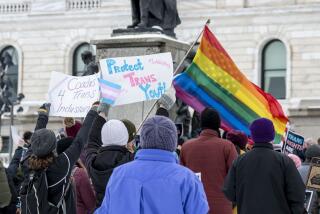Commentary: Here’s an idea: Maybe if we all stop talking about J.K. Rowling, she’ll just go away

Novelist J.K. Rowling is back in the news where, apparently, she longs to be. Never has a person who once claimed to have been “canceled” been allowed so much time, attention and diversity of platforms to continue her side-gig as a quasi-political commentator.
Her goal: to protect women from having their gender hijacked by those not born with a uterus while preventing predatory men from claiming to be transgender in order to invade female “safe spaces” and girls from being brainwashed into believing they are trans.
For the record:
7:41 a.m. Feb. 21, 2023An earlier version of this story identified Nicola Sturgeon as prime minister of Scotland. Sturgeon is first minister.
There have been tweets, there have been essays and now, there is a podcast, called “The Witch Trials of J.K. Rowling.” The title is certainly a suggestive, if not definitive, indication of whose side host and creator Megan Phelps-Roper is on.
Phelps-Roper, who has written extensively about her experience in, and eventual escape from, the wildly homophobic and generally hateful Westboro Baptist Church, claims that when interviewing people on all sides of the Rowling conflict, she was struck by how everyone involved felt they were being attacked — and how many of them used the term “witch hunt.”
The real difficulty, she says, is “knowing who is the witch and who is the mob.”
‘Hogwarts Legacy,’ a new video game set before the events of the ‘Harry Potter’ books, was released amid calls to boycott the title because it would support author J.K. Rowling and her views on the trans community. For some gamers, the decision on whether or not to play has become a moral question.
As the podcast revolves around an interview with Rowling, the real difficulty is imagining she sees Rowling as part of the mob. Indeed, a teaser for the series includes Rowling saying that she “never set out to upset anyone,” but that fans who feel she has risked her legacy “could not have misunderstood me more profoundly.”
Having listened to the first and second episode, I can tell you that the “misunderstanding” refers not to the things Rowling has written about transgender women, but to her fans’ belief that she is in the least worried about her legacy. “Who cares,” she says in the first episode. “I’ll be dead.”
Some, however, took the bait and others carried the baton. New York Times columnist Pamela Paul loosely used the podcast’s debut to write a full-throated defense of the author in which she claims that “nothing Rowling has said qualifies as transphobic.”
I don’t know how Paul defines transphobia, but Rowling’s stated belief that “when you throw open the doors of bathrooms and changing rooms to any man who believes or feels he’s a woman … you open the door to any and all men who wish to come inside” seems to have all the necessary ingredients.
Rowling was specifically referencing Scottish First Minister Nicola Sturgeon’s proposed Gender Recognition Reform Bill, which would have allowed people 16 or older to change their gender designation on identity documents without the previously required medical diagnosis of gender dysphoria, as well shortened the time required for them to be legally recognized as their expressed gender. (The bill was blocked by the British government, an unprecedented move Sturgeon has vowed to take to court.)
In protesting the then-proposed legislation, Rowling wrote: “The argument is that trans people aren’t mentally ill: being trans is as natural as being gay. As Rachel Cohen, campaigns director of Stonewall wrote in 2017, ‘Being trans is not about “sex changes” or clothes, it’s about an innate sense of self’. You may ask how anyone can assess the authenticity of somebody else’s ‘innate sense of self’. I haven’t a clue.”
Well, I suppose you could try asking them.
She goes on to tackle three arguments supporting the legislation: that trans woman are especially vulnerable, that they are not predatory and that it’s transphobic to believe a man would use the law to pretend to be a woman. Rowling counters that no trans women have been murdered in Scotland, “whereas 112 women were murdered by men in Scotland between 2009 and 2019”; that there is “no evidence to show that trans women don’t retain male patterns of criminality”; and that “sex offenders have historically been found amongst social workers, teachers, priests, doctors” etc.
In any case, to argue, as Paul and others have done, that Rowling has never made a transphobic statement in her life is absurd. The fact that Paul did it even as the New York Times was under fire from people in and outside its newsroom for perceived bias against the transgender community would be laughable if it weren’t so outrageous.
It’s tough to claim fair-mindedness while twisting the definition of transphobia to suit your personal needs.
Contrary to reports, Rowling’s ‘Ink Black Heart’ is not about a creator who is accused of transphobia. But (too) much of it is about internet fandom.
Yes, Rowling has said she does not support violence against trans women and men. She also claims to abhor discrimination of any kind. But for many, her opposition to the proposed policy in Scotland is discrimination, as is her belief that many trans children are the victims of social coercion. She is, by her own admission, very much afraid of what will happen if people are allowed to simply live legally protected lives as the gender they know themselves to be.
Particularly, she believes the definition of being female will somehow be diminished if it’s inclusive of those not born with female sex organs.
Which is, of course, just another version of “biology is destiny,” an argument that has kept women at a socioeconomic and political disadvantage for centuries. An interesting choice for someone who identifies as a feminist.
None of which would be in the public eye if she were just some random Brit, but as Rowling well knows, she has a platform and a persona that demands attention.
With a completely straight face, she has said she is speaking for those whose voices have been silenced by trans activists. But as Phelps-Roper points out in the beginning of the podcast, the transgender community has been at the center of heated debates for years, and it’s tough to argue that opponents of equal social and legal protection for transgender people have not been heard; they have been the prevailing voices for centuries.
Those hoping “The Witch Trials of J.K. Rowling” will somehow clear up the contradictions in the author’s insistence that she is not transphobic while repeatedly expressing fear of unregulated trans women will be, at least immediately, disappointed.
The first episode of “Witch Trials” is devoted to a detailed and rather breathy retelling of Rowling’s “origin story” — how she came to be, in Phelps-Roper’s words, the most successful writer in the history of publishing, and one whose work has been boycotted and banned, at different times and for different reasons, by people on opposite ends of the political spectrum.
It is worth noting that while Phelps-Roper finds it significant that Rowling’s opinions about the trans community have sparked attacks by liberals who once lauded her, she doesn’t seem as intrigued by the fact that the writer now aligns, on this topic at least, with many of the folks who banned her books out of fear they were teaching children witchcraft. (But maybe she gets to that later in the podcast.)
The single-mom-writes-book-that-changes-publishing backstory remains a terrific narrative, made even more immediate here by Rowling’s deeper revelations about her abusive first marriage. Her previous allegation of this abuse as an explanation for why she objects to the presence of trans women in women’s restrooms, hospitals, shelters, prisons and other “safe spaces” casts a shadow over the terrible details (including, at one point, her ex-husband holding the manuscript of “Harry Potter and the Philosopher’s Stone” hostage).
Rowling’s own trauma is terrible and undeniable. It does not, however, grant her special insight into the transgender community.
In the second episode, Phelps-Roper explores the zeitgeist of the ‘90s, pointing to factors as diverse as Bill Clinton’s impeachment and the Columbine school shooting as fuel for the rise of the religious right, many of whom saw “Harry Potter” as yet another example of society’s wanton endangerment of “family values.” Rowling herself still seems bewildered that the story of an oppressed young boy discovering that he was in fact someone very different than he had been led to believe — and finding power, love and friendship in that difference — could be seen as remotely dangerous children or families.
That Harry Potter’s journey toward self-understanding echoes the experience of so many trans individuals may explain the widespread sentiment that Rowling has now betrayed her readers.
Still, some of the response to Rowling’s unsolicited commentary, which has included vicious trolling and death, is unacceptable. No one should be threatened with death, or rape, or the abuse of their children, for something they have written. Period.
Recent threats to “cancel” and/or troll companies that carry — or critics that review — the new video game “Hogwarts Legacy” are just one example of how easily righteous outrage can become misplaced fury. Social media has made it too easy to react to reactions until, as in a game of telephone, the original issue is lost in a cacophony of condemnation and defense.
If nothing else, J.K. Rowling proves that. As controversy about her remarks swirled, she continued to write bestselling novels under the name Robert Galbraith even as her Harry Potter empire grew. At the Universal Orlando Resort, for instance, the Wizarding World has done nothing but expand.
Among some Harry Potter fans, Rowling may have become She Who Must Not Be Named, but of the millions of people in the world who require protection and defense, Rowling is not one. Far from being curtailed, her ability to say what she believes, no matter how unpopular or factually challenged those beliefs may be, has been amplified. She has a new podcast, for crying out loud. And it’s dedicated to telling her side of the story, which we already know!
Since it’s pretty clear that nothing is going to change her mind about the rights and realities of the trans community, perhaps we should just treat her like one of those dinner guests who randomly injects themselves into conversations with inappropriate and disturbing opinions no one requested.
Just tell her she sounds like one of those fanatics who used to burn “Harry Potter” books and never invite her into your home again.
More to Read
The biggest entertainment stories
Get our big stories about Hollywood, film, television, music, arts, culture and more right in your inbox as soon as they publish.
You may occasionally receive promotional content from the Los Angeles Times.













